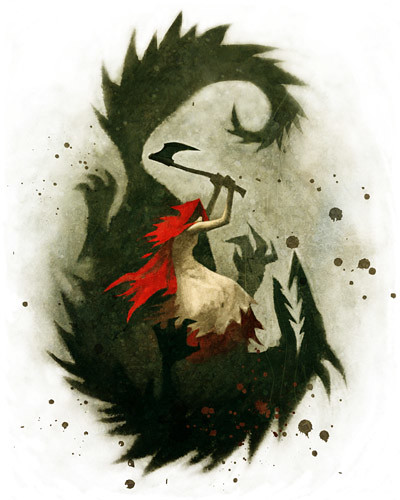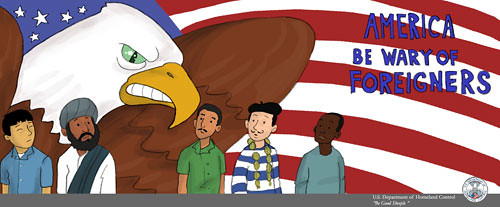Love it or hate it, people certainly have strong feelings about the demo. And, as you can see be some of the comments being made, they have pretty strong feelings about me personally. I guess that’s to be expected when a guy puts his name on top of everything he makes.
A couple of thoughts about what I’ve been hearing. First off: Yes, I moderate the comments that post to my blog. Better that than becoming an instant billboard for Online-gambling-penis-enlarging-stock-trading Co. And, hard as it may be to believe, if you write something that’s pure insult then I’ll probably not allow your comment to post. My mom reads my blog.
Next thing… aside from what a lot of people consider the general “suckiness” of the demo, this interview seemed to generate the most anti-American sentiment:
Computer Gaming World: So you take all these jobs overseas and deal with these hassles. How does it compare to here?
American McGee: U.S. game development teams are really creative, brilliant, innovative—and they’re really headstrong. A guy that I’d hire to be a junior artist would try to force an idea into a game and hijack the production, throwing a major monkey wrench into the process. That’s the Western development team. It’s the opposite with the Chinese team. If you come up with a good idea and you give them good direction, they’ll stamp it out. Problem is, they will not deviate a f***in’ inch from what I say. So the challenge is coming up with enough of a good idea, and…like, I find my days are now 80 percent just giving directions. And it’s really frustrating and really annoying and boring, but it works. Otherwise, I’ve had people following orders until there was nothing else to do. They just sit there and stare at the screen.
CGW: And do what?
AM: Nothing! They’re f***in’ frozen.
CGW: Are there any benefits, at least?
AM: Well, there is one obvious one. Labor is incredibly cheap in China and Hong Kong.
CGW: OK, Kathie Lee Gifford….
AM: Hey, that’s normal. It’s not like we’re doing something that everybody else doesn’t do. And what it means is that Bad Day L.A. has 120 unique NPC characters in it. That’s a lot of unique models and unique animations. That’s a lot of art assets.
I’d like to make it clear that my intention was not to ridicule or insult workers in China. I’m pointing out a clear distinction between two styles. US workers tend to be highly autonomous and self-motivated. Chinese workers have been taught by their government for decades that self-rule is a very bad thing. “The nail that sticks up gets the hammer” best describes the mentality I’m talking about. And I’m not the only person in the world to note this reality. It pervades every aspect of Chinese work-culture and has spawned dozens of books for Western managers working in China. Seems I didn’t express the point as maturely as I could have. Might have been because (as the interview notes) I was drinking while answering. Yeah, I can get drunk and make an ass of myself like the best of them.
Next, regarding the cost of labor in China. The reality is that an average game industry worker in China makes between US$500 and US$2000 per month, depending on position and experience. The guy making US$2k per month is receiving the equivalent of a US$100k salary in the US. The cost of living in China is really low, especially when compared to a high income/high cost of living country like the US. So, a workforce in China is going to be cheaper overall, but that doesn’t mean that you aren’t paying them or that you aren’t paying them well by local standards. Also, you aren’t working them insanely long hours – as might have been the case in the US before EA got itself sued by its employees. Not only because it isn’t ethical, but also because we’re not talking about machines here. These are skilled artists, animators, and programmers. They might have an unusual work mentality, but they are still human.
If you are uncomfortable with the concept of cheap, off-shore labor being used to produce the games you play, then I suggest you start making your own. We’re heading towards a world where %40 (or more) of a typical game budget is being spent on outsourcing. This money goes to places like China and India. That’s the reality of the world we live in. (Same goes for the majority of cartoons you watch, products you buy, etc.)
“As much as McGee rants and raves about EVIL corporations benefitting by manipulating the common man, it’s worth noting that he outsourced Bad Day L.A. to Chinese workers so he’d only have to pay slave labor wages, then he proceeded to ridicule them as mindless drones far beneath him…†-SA
I’ve said it before, I’ll say it again: I think companies like EA, Sony, Microsoft have a beautiful model for making money. My rants usually have to do with the fact that this model tends to skew towards “safe bets”, ie film license games, sequels, me-toos, etc. Doing something different is tough – Bad Day LA might be a good example of that.
Bad Day LA wasn’t outsourced to China. It was built 100% in China. “Slave labor wages” doesn’t make sense in today’s world. There is a normal market economy at work in Hong Kong and China. You offer someone “slave wages” and they’ll laugh in your face. Shanghai is a good example of the effect industry can have on the wages. As companies like Ubi and EA expand their operations the cost of labor goes up – for everyone. Again, we’re talking about highly skilled people – not assembly line machines. Finally, I don’t view anyone I work with as beneath me nor as drones.
Glad we could get that out of the way.
A serious amount of thanks to all of you who DO enjoy the game and have taken the time to say so. To the rest of you, I’ll do my best to let your negative comments through – but at least try to insult me in an original or funny way.


